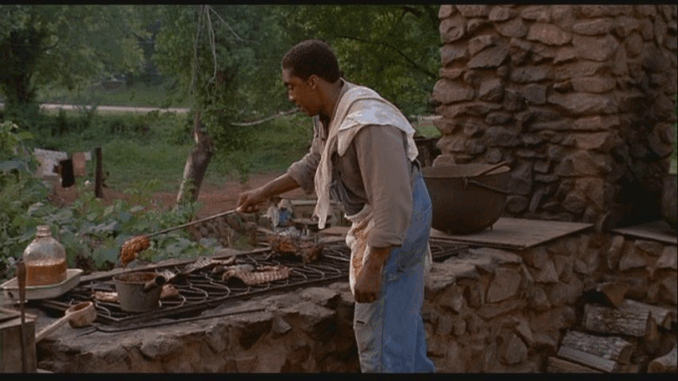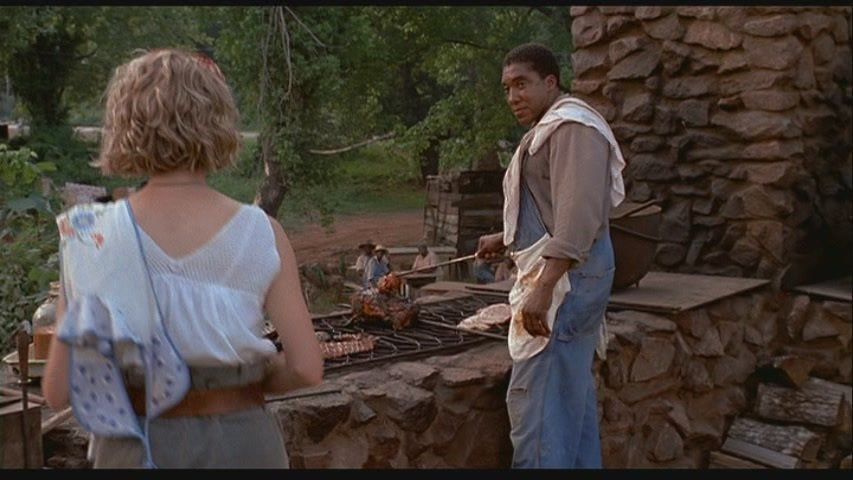
A Black Man in the Jim Crow South
Big George, the quiet but commanding figure from Fried Green Tomatoes, stands as a powerful symbol of dignity, labor, and endurance in a world stacked against him. Living in 1920s–1940s Alabama, George exists within the deeply oppressive framework of Jim Crow laws, where Black men were often denied humanity by the legal system, social conventions, and even the white neighbors around them. Yet, despite this systemic racism, George is never portrayed as defeated or broken. Instead, he moves with calm strength and humility, offering a powerful counternarrative to the dominant stereotypes about Black men of the era.
George’s role as a barbecue cook at the Whistle Stop Café might seem like a background detail, but in truth, it’s a metaphor for his role in the community. He labors in the smoke and heat, unseen by many, yet everyone is nourished by his work. The café’s success rests on the flavors he creates, and by extension, the warmth and unity he fosters in the town. Through George, we witness the experience of countless African American men who built the South’s economy but were rarely given credit.
More Than Muscle—A Father, Friend, and Craftsman
George’s towering physicality often masks his emotional intelligence, compassion, and the deep relationships he cultivates. As a father to multiple children and a devoted son to Sipsey, George is the anchor of his family. He works tirelessly not only to provide for them but also to protect them in a world that constantly threatens their safety.
He is not merely a worker or a sidekick; George is an artist. His skills in barbecue are not just culinary—they are cultural. Barbecue in the Deep South has long been associated with Black culinary tradition, passed down through generations as a source of pride and identity. George’s food brings people together across racial and class divides, creating a neutral ground in the often-divided world of Whistle Stop.

The bond between George, Idgie, and Ruth transcends race, status, and societal expectations. They treat him not as an employee but as part of the family. There is mutual respect, humor, and loyalty in their interactions. George is not intimidated by Idgie’s strong personality or Ruth’s grace; instead, he supports and reinforces their strength with his own.
Facing Injustice With Dignity
One of the most gripping moments in George’s story comes when he is accused of murder after the disappearance of Frank Bennett. His arrest is less about evidence and more about prejudice. In a society where a Black man could be lynched for far less, the accusation against George is a chilling reminder of how quickly a life can be destroyed.
The community’s quiet support for George during this time—especially from Idgie and her family—speaks volumes about how he is truly seen. Still, the trial reflects the painful reality that no matter how beloved or innocent he may be, George remains vulnerable to the whims of white power structures.
Yet through it all, George never loses his composure. He does not break under interrogation, nor does he respond with anger. His dignity is his protest. It is an act of resistance to carry himself with pride in the face of dehumanization. George’s survival of the ordeal, with the support of his chosen family, feels like a small victory—one that is all too rare in the history of Southern Black men.
His Legacy Beyond the Smoke Pit
Though George is not the protagonist, his legacy in Fried Green Tomatoes is enduring. He represents the thousands of Black men who built and nourished communities but were rarely given voice or visibility. Through George, the film offers a glimpse into a fuller, richer history of Southern life—one where Black men were not just victims or laborers, but creators, caretakers, and quiet revolutionaries.
One could imagine a future where George, perhaps emboldened by the love and loyalty of those around him, opens his own barbecue joint, passing his secrets on to his children. In that imagined world, George not only survives but thrives, his talent finally recognized on his own terms. Even if that vision is left unwritten, it lives in the memory of viewers who recognize George as the moral backbone of Whistle Stop.
His quiet strength, his unwavering loyalty, and his deep humanity make Big George one of the film’s most memorable and essential characters. He may not speak much, but his actions echo across generations, teaching us that true strength does not shout—it smolders, like the fire in his barbecue pit, steady and unstoppable.
